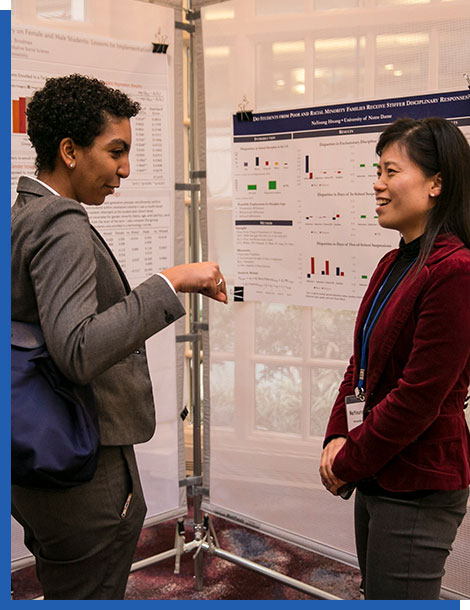Spring 2019

Theme: Tensions and Tradeoffs:
Responding to Diverse Demands for Evidence
Message from the 2019 Program Chairs
The Spring 2019 conference brings the tensions and tradeoffs among the questions practitioners and researchers study - and the decisions and constraints practitioners and researchers face - to the forefront of conversation. Much of SREE’s focus has been on rigorously developing the supply of high quality research and disseminating these findings to practitioners. Education practitioners are asking that effectiveness research be more responsive to their questions and be produced faster and at lower cost while providing more detailed information about implementation, cost, and effects for subgroups. They are asking for results to be summarized more clearly and succinctly and in accessible venues. The difference in approaches introduces tensions and tradeoffs that we need to address squarely as a research field. Some of these tensions are:
- Demands for quick-turnaround versus long-term research. What can we learn quickly (e.g. through rapid cycle studies or quick turnaround)? What can we not learn quickly? What are the roles of “slow” and “fast” studies?
- Demands for generalizable versus locally-based findings. What can we learn from research conducted in other districts and states? What must we learn by examining local contexts? How can the design and reporting of locally-focused studies increase the potential that they will contribute to knowledge outside of the original context?
- Demands to make decisions on topics not well studied. What is a practitioner to do when there is no high quality research on an intervention area? How can researchers best learn about the specific needs of practitioners?
- Demands for diverse access to evidence. How do we communicate about research evidence in ways that are credible, accessible, and understandable? What can we learn from how books, the internet, and social media are used by advocates, funders, policymakers, practitioners, researchers, and vendors? What tensions do these means of communication create for the traditional dissemination (and reward structures) of research dissemination?
- Demands for outcomes other than academic learning. What can we learn from the tensions among using and interpreting different student assessments and measures? What tradeoffs are made when studying academic and socio-emotional learning?
The Spring 2019 conference is organized around content areas focused on:
- Research Methods
- Early Childhood Education
- Academic Learning in Education Settings
- Social and Emotional Learning in Education Settings
- Education Policy
- Organization of Schools and Systems
- Postsecondary Education
- Education in Global Contexts
|